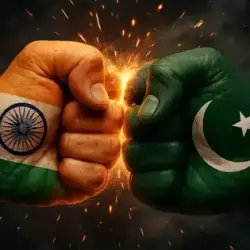Last updated on: May 29, 2013 at 3:49 pm
By
Desh Kapoor
Slumdog Millionaire, Yoga etc have moved people to explore India as a culture. But one thing that Slumdog Millionaire has also done is to create an interest in Americans in "Bollywood Dancing". We, from India, all know what it is.. a mix of just about everything - break-dance, hip-hop, Bhangra, stylized Latin American stuff, and anything else that comes along! All mixed with a unique Bollywood spicey masala.. a recipe that is potent. People who went to gym and used Salsa, modern dancing etc as a gym exercise, but some folks have gotten hooked by the Bollywood version really bad. 🙂 It is the exotic-ness and the unique vigor that probably provides a potent mix.[1] "I'd tried all of it. Modern dance and salsa and swing. Nothing has hooked me like this. I love the culture and the community and the spice," says Bollywood West student Claire Polsky, 45. Even non-Indian dance studios are incorporating Bollywood-style dancing into their repertoire. At the Atlanta Belly Dance studio, Bollywood moves have been incorporated into dances set to American pop songs. "Americans like exotic, but they like dancing to songs they know," says Schadia Hazlett, an owner of three studios of Atlanta Belly Dance, which has several hundred to 1,000 students at times. "It attracts a totally different clientele than salsa or samba." Read more



















